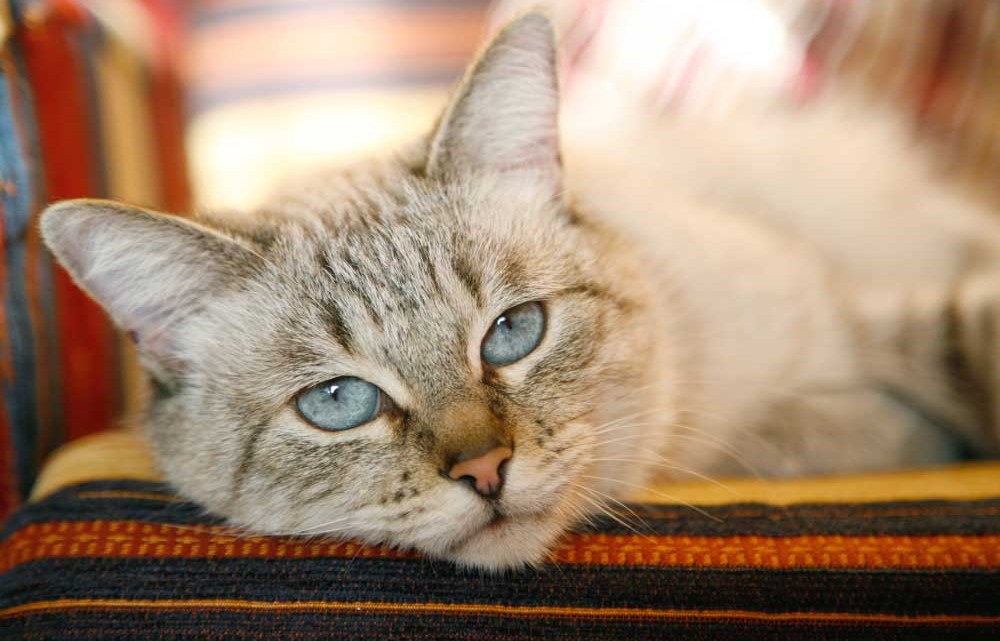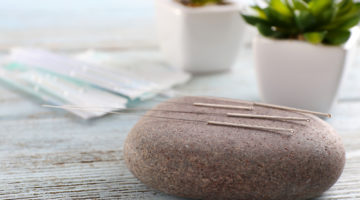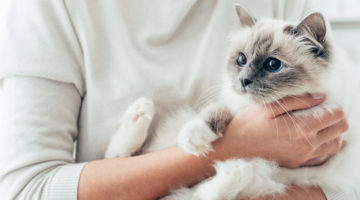Hyperthyroidism is a common disease in cats. Chinese herbal medicine is showing promise as a holistic way to treat it.
Hyperthyroidism is a common disease that affects middle-aged and older cats. Conventional veterinary medicine offers several options, which although effective, carry risks and side effects. A holistic therapy that’s proving useful in the treatment of this disease is Chinese herbal medicine.
Allopathic treatments
Conventionally, there are currently four treatment options for hyperthyroidism in cats:
- Lifelong medication
- Removal of the thyroid gland
- Radioactive iodine therapy
- A prescription diet with reduced iodine levels.
All these treatments present risks. Methimazole, the drug used to treat hyperthyroidism, comes with side effects ranging from mild (lack of appetite, vomiting, depression) to serious (anaphylaxis, bone marrow suppression, easy bruising or bleeding, jaundice, facial excoriation). Surgery always presents some level of risk, and radioactive iodine therapy, while it has a cure of 95% to 98%, may increase the risk of renal failure. The long term safety of an iodine-restricted diet for cats has not been evaluated.
Enter Chinese herbal medicine
There may be another option for treating hyperthyroidism: Chinese herbal medicine. Human trials have shown it can effectively reduce symptoms, thyroid antibody status and thyroid function in people with hyperthyroidism.
Chinese herbal medicines may be especially effective in the early stages of feline hyperthyroidism. They may even stop or reverse the development of the disease.
Interestingly, the formulas that work best for hyperthyroidism in cats do not directly impact the thyroid gland, but rather, act on the digestive tract.
The dietary connection
“Diet and digestion have long been linked epidemiologically to the incidence of feline hyperthryroidism,” explains veterinarian Dr. Steve Marsden. “The feeding of processed diets correlates strongly with the incidence of hyperthyroidism. Clinical experience suggests the incidence of hyperthyroidism is lower in animals that hunt for their food.”
Cats who become hyperthyroid often have a history of chronic vomiting, which would further support the theory that processed commercial diets and the systemic inflammation they cause may play a major role in the development of the disease.
“Increased exposure to gut flora from GI inflammation (a so-called ‘leaky gut’) is now broadly accepted as a major contributor to the formation of cross-reacting auto-antibodies in human hyperthyroidism,” says Dr. Marsden. ” For this reason, humans with inflammatory bowel disease are 400% more likely to contract hyperthryroidism than those without.” Theoretically, the effective treatment of “leaky gut” should help abort the development of hyperthyroidism.
Herbal formulas for hyperthyroidism
- One Chinese herbal formula that Dr. Marsden has found to work reliably in the early stages of feline hyperthyroidism is Wei Ling Tang (Harmonize the Stomach with Five Herbs and Poria). It possesses significant anti-inflammatory, antioxidant and anti-spasmodic properties that stop vomiting, promote normal appetite and repair the gut wall. “Anti-thyroid antibody levels appear to rapidly decline over the space of a few weeks, allowing thyroid levels to gradually normalize,” says Dr. Marsden. “If the hyperthyroidism is sufficiently early on in its progress, it will palpably diminish or disappear.”
- Chinese herbal medicines may also be useful during the stabilization phase of the disease by helping lower the cat’s heart rate and increase his weight. While not as powerful as conventional drugs, they are generally safer, and may allow the dose of conventional medications to be reduced. The main formulas Dr. Marsden recommends for the initial management of hyperthyroid cats include Anemarrhena, Phellodendron, and Rehmannia Combination (Zhi Bai Di Huang Wan).
- Renal support becomes a priority after conventional treatment has been provided. “Herbal medicine fills a gap in our conventional medical armamentarium,” says Dr. Marsden, adding that Chinese herbs can help support renal function by increasing the kidney’s ability to filter blood, remove excess waste and fluids, and concentrate urine. The herbs can also reduce renal hypertension. The most well-known formula for this purpose is the Chinese herbal blend Rehmannia Eight. One study of its use in human medicine showed a 91% efficacy in reducing renal damage.
“Chinese herbal medicine allows for the optimal management of hyperthyroid patients and integrates well with conventional therapies,” Dr. Marsden says. “Perhaps one day, it may be relied upon as a primary treatment option.”







No Comment